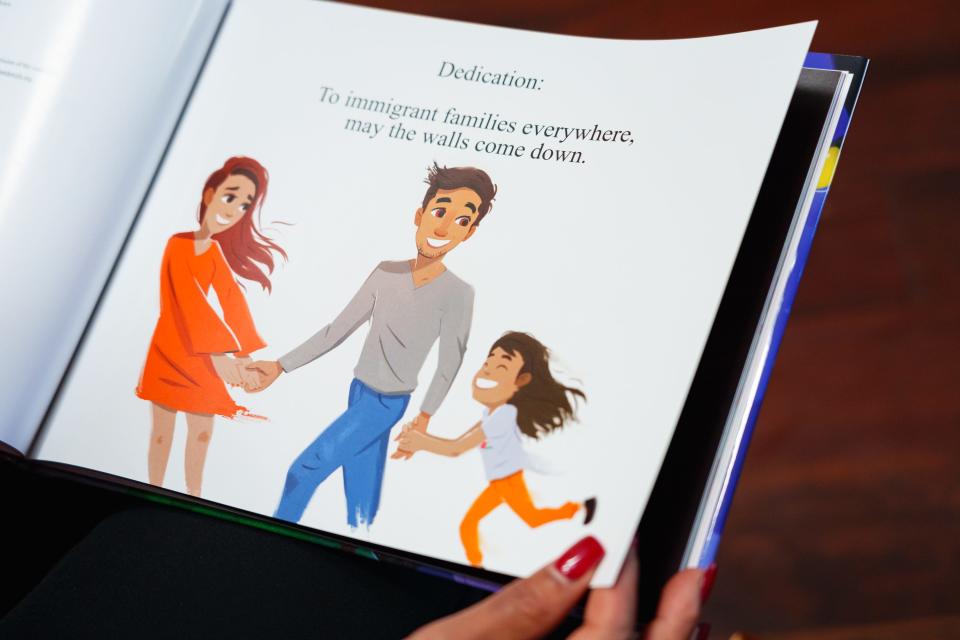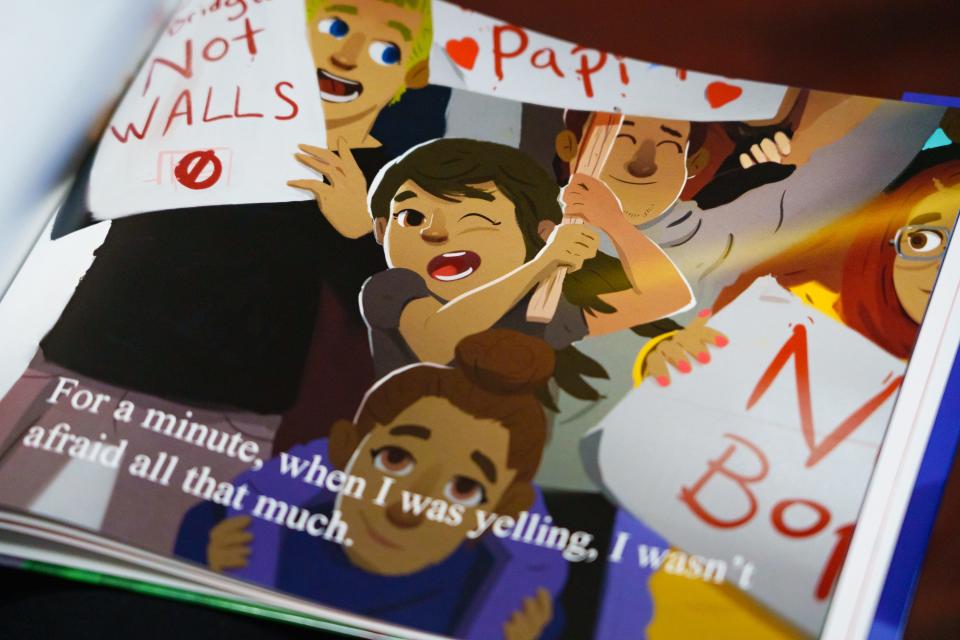Human rights activist writes books to help kids understand why loved ones are deported
"Can I tell you something? My dad is in jail."
According to human rights scholar-activist Dr. Angeles Maldonado, that's what Akemi, 8, told her while she was conducting interviews with children from various schools and pro-immigrant organizations in Phoenix as part of a university project on the impact of immigration laws.
Akemi's testimony impacted Maldonado, and after finding out more about the little girl's family situation she realized that the girl's father was not incarcerated, but was being held in an immigration detention center.
“When I found out about the situation, I felt the need to explain to the girl that her father did nothing wrong,” Maldonado, who works as an office administrator for the Ybarra Maldonado Law Group in Phoenix, said. “(Children) are taught that if you go to jail it is because you did something bad. In this case, they (detained Akemi's dad) just because he was undocumented and that confuses (children) a lot."
The first thing that occurred to her was to look for books that would help these children understand immigration laws and understand more about the subject, but it was very difficult for her to find them.
“There are many books on immigration, but it is difficult to find bibliographical material on immigration that is aimed at children. Books that are digestible and easy to understand for them just aren't there,” she said.
Backed by her experience writing for some media outlets, Maldonado had the idea of creating something that would contribute to this cause. She thought of writing a book that would give these children a message of encouragement and hope. That's how "Where is Daddy?" was born.

The 42-page book is eye-catching for children, with a full-color cover featuring an illustration of a girl walking hand-in-hand with her parents. It is also easy to read, with a format similar to that of a children's story. The illustrations were done by local artist Edward Deniss.
In the book, a little girl — whose story is based on Akemi's testimony — shares how sad she felt because her dad couldn't be present on her birthday. She says that sometimes he calls her on the phone, that sometimes she visits him in a detention center in Eloy and talks about her experience participating in immigration protests in Phoenix.
From Guanajuato, Mexico, to Phoenix, Arizona
Maldonado was born in Salvatierra, Guanajuato, Mexico, and was brought by her parents to Phoenix when she was 8 years old.
Maria Maldonado, Angeles Maldonado's mother, said that from a very young age her daughter showed leadership, from her home to the community.
"She was the one who organized her sisters to do their homework, she was the one who organized the parties. She has always distinguished herself by having the initiative and making her own decisions," Maria Maldonado said.
She grew up near 20th Avenue and Indian School Road. She studied at Central High School while her father worked as a bartender at a nightclub and her mother cleaned homes.
“That is why I always identified a lot with the immigration issue. My parents were always very hardworking ... and did everything possible to give me studies and move the family forward,” said Maldonado.

She earned her bachelor's degree in justice studies from Arizona State University, as well as a master's in public administration and a doctorate in education.
“As a human being, she is a very noble person, and if someone asks her for help, she is always ready to help," her mother said.
Another of the qualities that María sees in her daughter is the dedication she always put into her studies, distinguishing herself from her because of her intelligence.
"She was always a very studious girl, very intelligent. During the two years she did in Mexico she got first places, and at school here in Arizona she made pure 'A's.' I am very proud of her," said María Maldonado.
Maldonado is now the CEO of Ybarra Maldonado Law Group, a Phoenix-based firm that serves Spanish-speaking communities dealing with criminal and immigration cases.
She is also the founder and executive director of The Border Crit Institute, a nonprofit also based in Phoenix "whose mission is to foreground the voices and experiences of people of color living in the borderlands (through social justice education and pedagogy, borderland research, and the publication of counter-narratives of resistance)," Maldonado's site reads.

The book "Where's Daddy?" can be ordered through The Border Crit Institute website, or you can go directly to www.dondeestapapi.com where it is available for Kindle download.
Maldonado said she is in talks with a publisher to be able to print it cheaply, and make it easier to market.
Janet Rocha has known Maldonado since 2017 and said she is a person who cares about helping others.
“She is passionate about organizing within the community,” said Rocha, who works with her at the law firm. “She always finds a way to say 'yes' to help the community, whether it's at protests, events or community service."
Rocha was present in some of the interviews that Maldonado conducted with children as part of the work behind "Where is Daddy?" The work that Maldonado did in order to make that book a reality resonates deeply with Rocha.
"My ex-husband and I had to go through a deportation process, we had a 3-month-old girl, (my ex-husband) was deported and did not return to the U.S. until she was 2-years-old," Rocha shared. “(My daughter) does not remember that separation, but she has read the book and is moved without knowing that she experienced something similar. The book opened the door for her to ask questions and understand the situation she went through, and that is something that happens to many children."
Storytelling through art: Phoenix woman brings awareness to issues affecting undocumented people
More than a book, a resource
"What would you do if you were President of the United States?" was another of the questions that Maldonado asked those children during the interview rounds.
While some responded that they would build a large chocolate fountain or build more amusement parks, Akemi replied that she would knock the border down with sticks, as if it were a piñata.
"These are very innocent responses, but in a certain way they reflect the frustration they feel due to the absence of their loved one, and with this book, I seek to contribute a little relief to the bad situation they are going through," Maldonado said.
According to a report by the American Immigration Council, a total of 4.4 million American children under the age of 18 lived with at least one undocumented parent in 2018. In addition, half a million U.S. citizen children had at least one parent deported between 2011 and 2013.
“Many affected children find themselves questioning their identity, their sense of security, their capacity for action and their belonging. This experience of crossing geographical and cultural borders is the impetus for writing this book,” Maldonado said. “Create a story that resonates with the lived reality of immigrant children and offer words of encouragement and hope.”

Maldonado said that many of the quotes attributed to the main character are actual quotes from young children living in Arizona.
While Arizona has a long history of anti-immigrant rhetoric, especially while former Maricopa County Sheriff Joe Arpaio was in office and the controversial "show me your papers" law SB 1070 was implemented in 2010, Maldonado said that the issues many immigrant and Latino families face continue to be a serious problem.
“When we were under the Trump Administration, even under Joe Arpaio, everything was more public. But today the problem continues. Latino families continue to be victims of discrimination in housing, at work and in many other areas,” Maldonado said. “We continue to see families that are being separated. It is a reality. We must move forward to try to alleviate the situation or help families who are going through this.”
Her firm and nonprofit aim to help the community by providing legal and education resources. In order to meet community need, she has also collaborated with several local organizations such as Chicanos Por La Causa, The American Civil Liberties Union and La Union del Pueblo Entero.
Immigration resources
Freedom For Immigrants, a nonprofit organization that protects the rights of people detained in immigration centers, has useful resources on its website for people facing deportation proceedings.
Since 2010, Immigration and Customs Enforcement opened an ICE Detainee Locator on its website that allows people to locate people who are detained by the agency. They also have a family support line where those interested can call 209-757-3733. Website: https://locator.ice.gov/odls/
The Executive Office for Immigration Review has created a toll-free phone number 1-800-898-7180 for immigration courts where individuals can receive information about their cases through an automated system 24/7.
The U.S. Department of Justice's Executive Office for Immigration Review maintains a list of free legal service providers by state: https://www.justice.gov/eoir/list-pro-bono-legal-service-providers
If you choose not to use one of the resources listed above to find an immigration attorney, check out the USCIS website and read about how to avoid scams: https://www.uscis.gov/es/fraude-estafas-y-fallas-en-el-desempeno/evite-las-estafas-de-inmigracion
For more information, those interested can visit the Freedom for Immigrants website: https://www.freedomforimmigrants.org/
Reach La Voz reporter and editor Javier Arce at javier.arce@lavozarizona.com or on Twitter @javierarce33.
Support local journalism. Subscribe to azcentral.com today.
This article originally appeared on Arizona Republic: Phoenix activist Angeles Maldonado helps kids understand deportation

